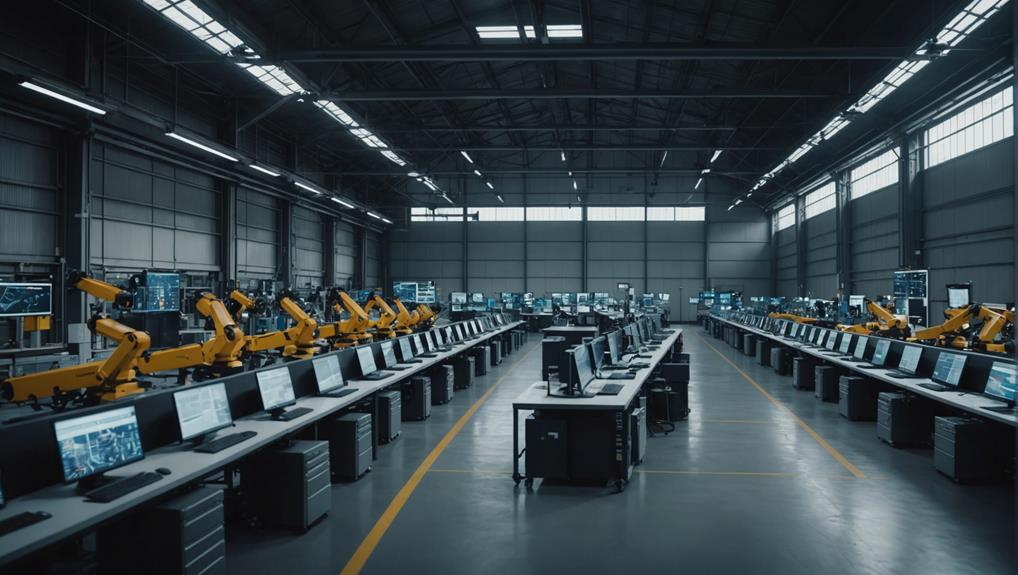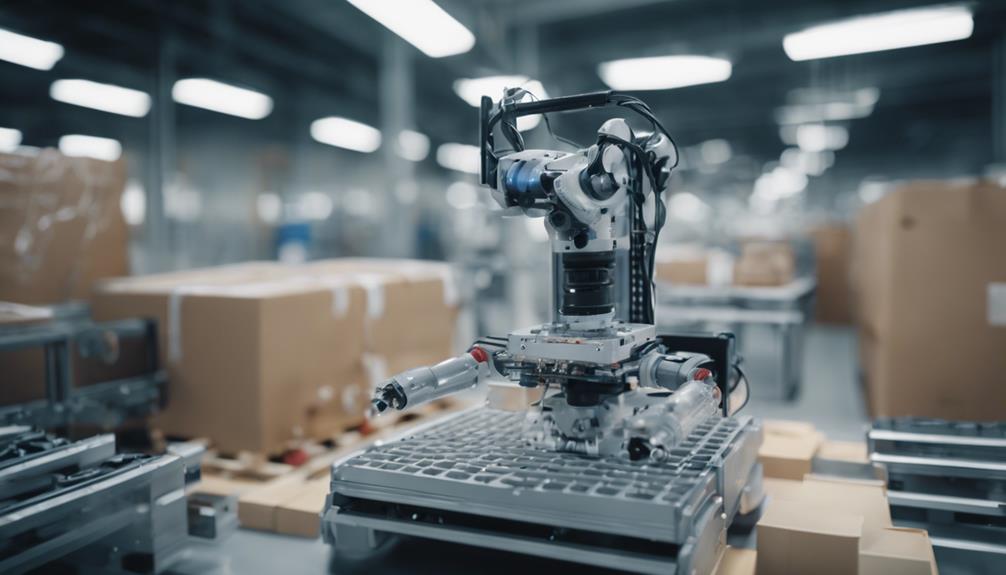Physical Address
304 North Cardinal St.
Dorchester Center, MA 02124
Physical Address
304 North Cardinal St.
Dorchester Center, MA 02124

Optimizing supply chain management with AI-powered tools revolutionizes decision-making, enhances operational efficiency, and boosts supply chain visibility. AI streamlines operations, leverages data-driven insights, and cuts costs through efficient processes. Benefits include improved decision-making, resource optimization, and procurement enhancements. Integrating AI enhances forecasting accuracy, optimizes inventory levels, and automates strategic planning tasks. Forecasting accuracy is heightened by AI algorithms, predictive analytics, and machine learning in demand planning and inventory optimization. Real-time monitoring, alerts, and inventory management are streamlined with AI automation. Future trends suggest AI-enabled automation, innovative SCM solutions, and enhanced supply chain visibility. Subtle insights await for those curious about the depths of AI-powered SCM advancements.

When it comes to supply chain management, I depend on Intelligent Decision Support Systems to streamline operations efficiently. These systems provide decision-making support through machine learning, enabling intelligent supply chains that leverage cognitive computing to enhance performance. By utilizing data-driven insights, these systems help in making informed decisions swiftly, optimizing processes, and reducing costs.
Intelligent Decision Support Systems play an essential role in enhancing supply chain management by analyzing vast amounts of data to identify patterns and trends. Through machine learning algorithms, these systems can predict demand more accurately, optimize inventory levels, and streamline logistics operations. This ability to proactively adjust to changing market conditions ensures that the supply chain remains agile and responsive to fluctuations in demand.
Moreover, the integration of cognitive computing in supply chain management allows for real-time monitoring and decision-making. By automating routine tasks and providing actionable recommendations based on data analysis, these systems enable companies to operate more efficiently and effectively. The continuous learning capabilities of intelligent decision support systems ensure that supply chains adapt and evolve to meet the demands of a dynamic business environment.
AI enhances supply chain management by revolutionizing decision-making processes and optimizing operational efficiency. One key benefit is the improvement in supply chain efficiency. AI algorithms can analyze vast amounts of data in real-time, enabling companies to make more accurate demand forecasts, manage inventory levels effectively, and streamline logistics operations. This leads to a reduction in stockouts, overstock situations, and overall supply chain disruptions.
Another significant advantage is cost reduction. By leveraging AI technology, organizations can identify cost-saving opportunities within their supply chain. For instance, AI can help in optimizing transportation routes, minimizing fuel consumption, and reducing lead times. Additionally, AI-powered tools can enhance procurement processes by identifying the best suppliers based on various factors such as price, quality, and reliability. This strategic sourcing approach can lead to negotiated cost savings and improved supplier relationships.

AI tools are revolutionizing supply chain management by enhancing forecasting accuracy and optimizing inventory levels. By leveraging AI for forecasting, businesses can better predict demand, leading to improved inventory management and reduced stockouts. Integrating AI into inventory management processes enables real-time insights, enhancing decision-making and overall supply chain efficiency.
Utilizing advanced forecasting algorithms powered by artificial intelligence has revolutionized supply chain management processes. Machine learning plays a vital role in optimizing inventory levels by analyzing historical data and predicting future demand patterns. This technology enables businesses to streamline their operations, reduce excess inventory costs, and improve overall efficiency.
Deep learning takes supply chain forecasting to a new level by leveraging complex neural networks to analyze vast amounts of data. This sophisticated approach enhances the accuracy of demand forecasting, leading to better inventory management decisions and minimizing stockouts or overstock situations.
AI-driven forecasting tools provide real-time insights that help organizations adapt to changing market conditions quickly. By harnessing the power of AI, businesses can make informed decisions, enhance customer satisfaction, and ultimately drive profitability. Embracing these innovative technologies not only improves forecasting accuracy but also empowers supply chain managers to proactively respond to market fluctuations and optimize their inventory strategies for long-term success.
Integrating AI tools into supply chain management greatly enhances inventory optimization capabilities. AI in procurement streamlines the process by predicting demand more accurately, reducing excess stock, and preventing stockouts. These AI-powered systems analyze data patterns to forecast inventory needs, improving decision-making for inventory managers. By automating tasks like reordering and tracking stock levels, AI minimizes human error and frees up time for strategic planning.
AI in inventory optimization also enhances supply chain efficiency by identifying trends and potential disruptions in real-time. This proactive approach enables businesses to adjust their inventory levels promptly, reducing holding costs and improving overall operational performance. Additionally, AI algorithms can optimize warehouse layouts and storage methods, maximizing space utilization and minimizing handling times.
AI plays a pivotal role in enhancing forecasting accuracy within supply chain management. By leveraging AI for demand forecasting, businesses can make more informed decisions based on predictive analytics applications. This data-driven approach leads to optimized forecasts, ultimately improving overall operational efficiency.
By leveraging advanced AI algorithms, demand forecasting accuracy can be greatly enhanced. Machine learning plays an essential role in improving demand planning by analyzing historical data, market trends, and other relevant factors to predict future demand more accurately. These AI-powered tools can process large volumes of data in real-time, allowing for quicker adjustments to changing market conditions. By incorporating AI into demand forecasting processes, businesses can make more informed decisions regarding inventory levels, production schedules, and distribution strategies.
AI algorithms can identify patterns and correlations within the data that might be challenging for traditional forecasting methods to detect. This capability enables companies to anticipate fluctuations in demand more effectively, reducing the risk of stockouts or overstock situations. Additionally, AI can continuously learn and adapt to new information, enhancing the accuracy of demand forecasts over time.
Using predictive analytics applications has revolutionized the accuracy of forecasting by harnessing the power of AI technology. Supply chain visibility is enhanced through machine learning algorithms that analyze vast amounts of data to predict future demand patterns. This enables proactive decision-making and better allocation of resources. Inventory optimization is another key benefit, as predictive modeling helps in maintaining ideal stock levels, reducing excess inventory costs, and preventing stockouts.
Machine learning algorithms can identify trends and patterns that humans might overlook, leading to more precise forecasts. By leveraging historical data and real-time information, predictive analytics applications provide insights into consumer behavior and market dynamics. This enables businesses to adapt quickly to changing demands and stay ahead of the competition.
Incorporating predictive analytics into supply chain management processes not only improves forecasting accuracy but also enhances operational efficiency. It allows for better planning, resource utilization, and ultimately leads to cost savings. Embracing AI-powered tools for predictive analytics is essential in today's dynamic business environment to drive success and maintain a competitive edge.
Enhancing forecasting accuracy through data-driven optimization is a pivotal aspect of leveraging AI technology in supply chain management. By incorporating AI tools into demand planning, supply chain visibility is enhanced, allowing for real-time monitoring of market trends and consumer behaviors. This increased visibility enables companies to make more informed decisions regarding inventory levels and distribution strategies, ultimately leading to improved customer satisfaction and operational efficiency.

I depend on AI-powered tools for real-time monitoring and alerts in my supply chain management strategy. These tools provide vital insights into my operations by offering supply chain visibility and generating predictive alerts based on real-time data analysis. With automated notifications, I can promptly address any issues that arise, guaranteeing that my supply chain functions smoothly.
The ability to track my inventory, shipments, and production processes in real-time is invaluable. It allows me to proactively identify potential bottlenecks or delays, enabling me to take corrective action promptly. By leveraging AI-powered tools for real-time monitoring, I can make informed decisions swiftly, optimizing my supply chain efficiency.
Moreover, the automated notifications feature ensures that I am promptly alerted to any anomalies or deviations from expected performance metrics. Whether it's a delay in shipment, a sudden increase in demand, or a disruption in the production process, these alerts enable me to respond in a timely manner, mitigating risks and maintaining operational continuity.
In today's fast-paced business environment, real-time monitoring and alerts are essential for effective supply chain management. By harnessing the power of AI-powered tools, I can stay ahead of potential issues, streamline operations, and deliver superior service to my customers.
One key aspect of optimizing my supply chain operations involves efficiently managing inventory processes. To achieve this, I focus on the following key strategies:

Utilizing AI-powered tools revolutionizes supply chain management by optimizing processes and enhancing decision-making capabilities. Machine learning, a subset of artificial intelligence, plays an essential role in analyzing vast amounts of data to identify patterns and trends that humans may overlook. By implementing machine learning algorithms, supply chain managers can make more informed decisions based on predictive analytics rather than reactive measures.
Optimization techniques, another key aspect of AI-driven strategies, involve fine-tuning various processes within the supply chain to improve efficiency and reduce costs. These techniques range from route optimization for logistics to demand forecasting for inventory management. AI can analyze historical data and real-time information to suggest best-fit solutions that lead to streamlined operations and improved overall performance.
Through the integration of machine learning and optimization techniques, AI-driven optimization strategies enable supply chain managers to adapt quickly to changing market conditions and consumer demands. By continuously learning from new data inputs, AI-powered tools can enhance decision-making processes, minimize risks, and drive continuous improvement across the entire supply chain. Embracing these advanced technologies empowers organizations to stay competitive in today's fast-paced business environment.
Looking ahead, the evolution of artificial intelligence in supply chain management (SCM) is set to introduce groundbreaking advancements that will shape the future landscape of the industry. As we consider the future trends in AI for SCM, three key areas stand out:
By leveraging AI tools for data analysis and demand planning, resilience in the supply chain can be enhanced. These technologies provide real-time insights, helping to anticipate disruptions and optimize operations swiftly.
Ethical implications of AI in SCM could include bias in decision-making or data privacy concerns. Transparency issues may arise if algorithms are not fully understood. It's important to address these issues for responsible AI integration.
When it comes to forecasting accuracy, AI limitations often stem from data bias and model complexity. These factors can hinder the system's ability to provide reliable predictions, impacting decision-making processes within the supply chain.
When unforeseen disruptions occur, AI excels at real-time adaptation by swiftly analyzing data to propose solutions. It enhances monitoring capabilities, enabling proactive responses to challenges, ensuring operational efficiency and resilience in the supply chain.
Absolutely, AI can optimize sustainability practices in the supply chain by analyzing data to reduce waste and emissions. Efficiency improvements are key, helping to make operations more eco-friendly while enhancing overall performance.